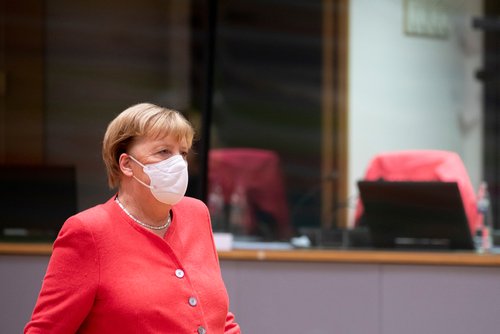Brussels (Brussels Morning) German vice chancellor and Finance Minister Olaf Scholz, the Social Democrats’ (SPD) candidate for chancellor in the upcoming federal elections in September, believes he has a good chance to succeed Angela Merkel, betting that his experience gives him a solid advantage over the other candidates, despite his party not shining in the polls.
Despite a surprise upset in May, when the Greens polled in first place, ahead of Merkel’s Christian Democratic Union (CDU), the chancellor’s party bounced back in June and is currently polling at 26-28%, ahead of the Greens’ 20-22%. The SPD, once considered one of the two pillars of German politics, is in third place, polling at 14-17%.
Scholz remains optimistic, telling Reuters that the polls place the Social Democrats “within striking distance” of the leading two parties. However, the decline of SPD was long in the making, and it remains to be seen whether Scholz can make up the lost ground by September.
Dragged down by years of coalition with its traditional main rival, the CDU, Scholz’s party is in a difficult spot to offer changes and present itself as the new option. The Finance Minister reportedly plans to make the most of this situation by presenting it as an advantage – representing himself as a continuity candidate, and an experienced crisis leader to boot.
Facing CDU’s Armin Laschet and the Greens’ Annalena Baerbock as main opponents in the coming elections, Schulz has so far refrained from attacking his rivals directly. Instead, other members of his party have done the job for him, questioning Laschet’s ability to make tough choices and emphasising Baerbock’s lack of leadership experience.
Most popular
If the federal elections were focused only on the chancellor candidates, Scholz would be well ahead, with 48% of Germans perceiving him as the best successor to Merkel. Laschet, who faced a tough, uphill battle within his own party just to get the nomination as chancellor candidate, is polling at around 43%, while Baerbock is seen as the best choice by some 28% of voters.
Despite two serious business-related scandals during his three and a half years as Finance Minister, Scholz managed to emerge from parliamentary inquiries relatively unscathed. His management of the economic fallout of the coronavirus pandemic received high praise from the International Monetary Fund, and his budget spending spree made a difference for many Germans who kept their jobs thanks to the government’s pandemic aid programmes.
Presenting himself as an experienced crisis manager, experienced in leadership roles and high politics, Scholz’s strategy is to push his message through by September, pulling his party into second place, which would then enable it to form a ruling coalition with the Greens and the liberal Free Party (FDP).
Some German analysts, however, believe this is a plan that requires other candidates to show weaknesses and make mistakes. Despite Laschet’s lack of charisma and popularity, the CDU voters see him as representing a continuation of Merkel much more so than Scholz, making it unlikely that the Social Democrat would win the centrist voters. His best bet would be if a sudden crisis popped up before the elections, a foreign policy upset, for example, where voters would turn to his proven ability to handle such events.




